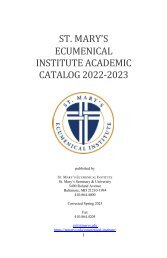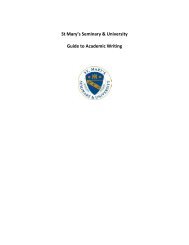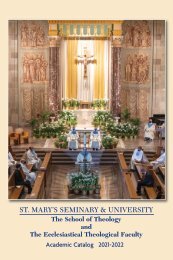EI Student Handbook 2022-2023
This Student Handbook supplements the current academic policies and procedures, which are published on our website. It also provides practical guidance for study and life within St. Mary’s Ecumenical Institute. We hope it serves as a tool of both communication and community.
This Student Handbook supplements the current academic policies and procedures, which are published on our website. It also provides practical guidance for study and life within St. Mary’s Ecumenical Institute. We hope it serves as a tool of both communication and community.
Create successful ePaper yourself
Turn your PDF publications into a flip-book with our unique Google optimized e-Paper software.
Goals and Objectives<br />
In light of its mission statement, St. Mary’s<br />
Ecumenical Institute recognizes certain goals and<br />
objectives in its programs, with the conviction that<br />
its graduates should possess certain intellectual,<br />
ecumenical, and (depending on their program)<br />
practical skills gained or enhanced during their<br />
time of study.<br />
Intellectual Skills<br />
Intellectual skills are evidenced in class<br />
discussion, initiative in theological conversation<br />
and research, and carefully prepared and argued<br />
papers. These skills include the following:<br />
Knowledge of the Judeo-Christian theological<br />
tradition: the acquisition of knowledge of the<br />
Scriptures of both Testaments, the Jewish roots of<br />
Christianity and the ongoing relationship of<br />
Christianity to Judaism, the significant aspects of<br />
Christian theology in historical and contemporary<br />
perspective, aspects of historical and<br />
contemporary practices of Christian spirituality,<br />
and the fundamentals of Judeo-Christian<br />
theological ethics and the variety of perspectives<br />
that this ethical tradition offers to contemporary<br />
issues, all informed by the best contemporary<br />
ecumenical theological scholarship<br />
Skill in the exegesis of texts: ability to engage in<br />
the historical, literary, and conceptual analysis of<br />
primary sources in the theological tradition,<br />
including Scripture, theological documents, and<br />
ancillary sources<br />
Theological curiosity: the desire for the<br />
acquisition of new knowledge and perspectives<br />
Awareness of theological and ethical issues:<br />
acquaintance with major contemporary theological<br />
and ethical questions, the complexity of those<br />
issues, and the variety of religious perspectives on<br />
them<br />
Theological reflection: the ability to engage in<br />
careful, critical, and creative reflection on and<br />
about theological sources, traditions, and issues<br />
Intellectual integration: understanding of the<br />
interconnections among various theological<br />
disciplines and of the relationship between<br />
theological reflection and praxis.<br />
Ecumenical Skills<br />
Ecumenical skills are evidenced in class<br />
discussions and written papers that exhibit<br />
knowledge, fairness, accuracy, and respect in the<br />
consideration of other people and religious<br />
traditions. These skills include the following:<br />
Ecumenical and interfaith understanding:<br />
knowledge of key historical developments in intra-<br />
Christian and interreligious relations;<br />
understanding of similarities and differences<br />
among various religions and traditions within<br />
religions (especially Christianity in its American<br />
context); and familiarity with key areas of<br />
disagreement, dialogue, and cooperation<br />
Ecumenical and interfaith respect: appropriate<br />
regard for the traditions of others and for the<br />
people who are part of those traditions<br />
Ecumenical and interfaith dialogue: the ability<br />
to engage in fair and respectful dialogue with<br />
people from other religious traditions in a spirit<br />
that reflects both commitment to one’s own<br />
tradition and willingness to learn from others and<br />
their traditions<br />
Practical Skills<br />
Practical skills are evidenced in the clear, coherent<br />
analysis and articulation of ideas, and (when<br />
appropriate) in the integration of theory with<br />
practice in the exercise of particular forms of<br />
ministry. These skills include the following:<br />
Critical thinking: the ability to analyze,<br />
synthesize, and evaluate theological texts and<br />
arguments<br />
Excellence in communication: the ability to<br />
articulate one’s perspectives, insights, and<br />
convictions in excellent English, both orally and in<br />
writing<br />
10







